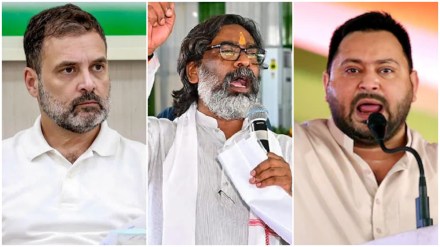Bihar Assembly Election 2025: The Jharkhand Mukti Morcha (JMM) announced on Monday that it is leaving the Mahagathbandhan alliance and will not be contesting the upcoming Bihar Assembly Elections 2025.
JMM leader Sudeep Kumar Sonu announced the party’s decision at a press conference in Giridih, Jharkhand. This comes just two days after JMM general secretary Supriyo Bhattacharya had said on Saturday that the party planned to contest six seats in Bihar, separating from the Mahagathbandhan alliance, which includes the Congress and the RJD.
Why is JMM not contesting in Bihar polls?
JMM leader Kumar Sonu said the decision to not contest the elections was taken because of RJD’s political maneuvers that undermined the party, ending its hopes of contesting in Bihar. He added that the Congress also shares responsibility for not ensuring JMM’s inclusion in seat-sharing talks. “Where an important ally of the INDIA bloc has been prevented from contesting, there must be reasons — but we hold the RJD leadership fully responsible for this situation,” Kumar Sonu said.
Sonu recalled that JMM had supported the RJD in 2015 and had worked with the Congress, RJD, and Left parties in Jharkhand in 2024. He said the party had been promised three seats in 2020, but those promises were changed at the last minute, a situation that has repeated in 2025.
Sonu revealed that he and fellow JMM leader Vinod Pandey were assured of receiving seats at a meeting that was held in Patna with RJD leader Tejaswi Yadav on October 7.
He further added that they had identified 28 seats in Bihar with a significant tribal voter population, 22 of which were narrowly lost in previous elections. He said JMM could have influenced tribal votes in favor of the INDIA alliance and helped convert these seats.
Big crack in Grand Alliance
JMM’s decision to pull out of the 2025 Bihar Assembly elections has exposed a serious divide within the Mahagathbandhan. The move clearly highlights the reported disputes over seat-sharing and power struggles between key opposition parties – RJD and the Congress.
Politically speaking, JMM’s exit naturally weakens the unity of the Grand Alliance in Bihar and this could lead to a split of Opposition votes, giving the ruling NDA a clear advantage. The BJP leaders have till now repeatedly pointed to the ‘unstable’ infighting as a sign of leadership failure. And there is no doubt that this is going to be of advantage to the NDA in the campaign rallies.
Also, it is not just about Bihar. JMM’s decision is also going to have political impact in Jharkhand.
Political consequence in Jharkhand
Sonu said that the people of Jharkhand don’t forget humiliation and that JMM will assert itself as a strong representative of India’s tribal communities. He added that the party will reconsider its ties with the INDIA/Mahagathbandhan allies based on their actions and make decisions that protect JMM’s political interests and benefit Jharkhand.
He accused both the RJD and Congress of failing to honor their responsibilities within the coalition. Sonu said that while JMM had often adjusted its seats in past elections to support its partners, the current situation in Bihar felt like disrespect and unfair political treatment.
He also slammed Congress for not making a genuine effort to safeguard the political role of a key alliance partner, saying that their silence amounted to insult. This shift could ultimately benefit the NDA, which may now have an easier path to gather more tribal votes.
Tribal representation at risk
The JMM had intended to contest in six constituencies which fall along the Bihar-Jharkhand border, namely Chakai, Dhamdaha, Katoria, Manihari, Jamui, and Pirpainti. These areas have a significant tribal population and thus were important to build a more unified political voice within the Mahagathbandhan. With JMM now stepping back after accusing the RJD and Congress of “betrayal,” the representation has now significantly weakened. JMM leaders have said that being excluded has “hurt the sentiments of the tribal people” and described it as a deliberate attempt to reduce their political influence.
Now, when the nomination filing process is over and the parties will actively campaign in Bihar in coming days, JMM’s exit has left a huge gap in Mahagathbandhan’s efforts to reach out to the tribal voters. While RJD and Congress still plan to field candidates in some of these areas, their campaigns primarily focus on backward caste and minority communities rather than the tribal populations. As a result, many Adivasi voters, who had previously supported JMM because of Hemant Soren’s record in Jharkhand, might feel politically disconnected or divided.
Wholistically speaking, JMM’s withdrawal from the elections not only reduces visible tribal leadership in the elections but also threatens the cross-border political connection between tribal communities in Jharkhand and Bihar, which JMM had been working to strengthen.
